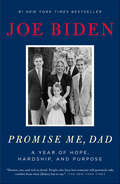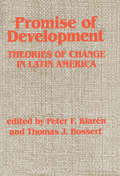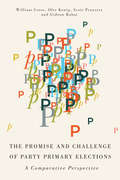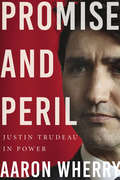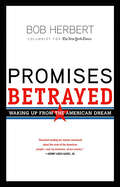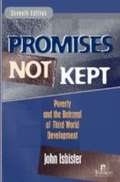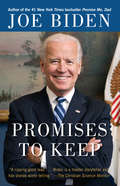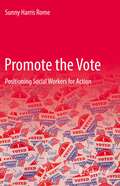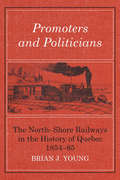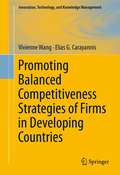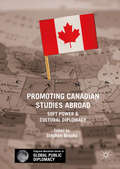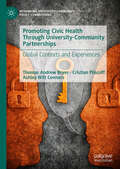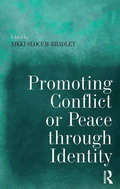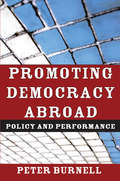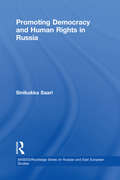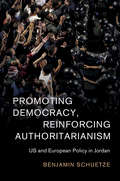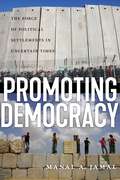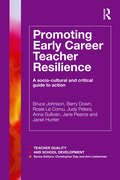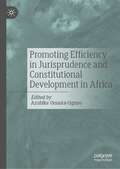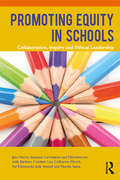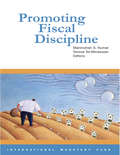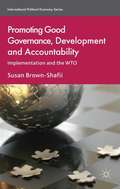- Table View
- List View
Promise Me, Dad: A Year of Hope, Hardship, and Purpose
by Joe BidenThe instant #1 New York Times bestseller: From President Joe Biden, a deeply moving memoir about the year that would change both a family and a country.In November 2014, thirteen members of the Biden family gathered on Nantucket for Thanksgiving, a tradition they had been celebrating for the past forty years. But this year felt different from all those that had come before. Joe and Jill Biden’s eldest son, Beau, had been diagnosed with a malignant brain tumor fifteen months earlier, and his survival was uncertain. “Promise me, Dad,” Beau had told his father. “Give me your word that no matter what happens, you’re going to be all right.” Joe Biden gave him his word.Promise Me, Dad chronicles the year that followed, which would be the most momentous and challenging in Joe Biden’s extraordinary life and career. As vice president, Biden traveled more than a hundred thousand miles that year, across the world, dealing with crises in Ukraine, Central America, and Iraq. When a call came from New York, or Capitol Hill, or Kyiv, or Baghdad—“Joe, I need your help”—he responded. For twelve months, while Beau fought for and then lost his life, the vice president balanced the twin imperatives of living up to his responsibilities to his country and his responsibilities to his family. And never far away was the insistent and urgent question of whether he should seek the presidency in 2016.Writing with poignancy and immediacy, Promise Me, Dad is a story of how family and friendships sustain us and how hope, purpose, and action can guide us through the pain of personal loss into the light of a new future.
Promise Of Development: Theories Of Change In Latin America
by Peter F KlarenIn recent years Latin Americanists have been among the most innovative and productive theorists about the uneven process of development. This collection of substantial selections from some of the most prominent theorists in the field represents a scholarly consolidation and reassessment of the controversies concerning the development of Latin America.Beginning with a historiographic overview, the editors emphasize the origins, evolution, and historical context of the development of each theoretical school (modernization, dependency and Marxism, corporatism, and bureaucratic authoritarianism), then present key selections drawn from the writings of major theorists, organized by school. Each selection is prefaced with a short editorial introduction that highlights the central themes to follow. A concluding section outlines the main debates surrounding each school and suggests new directions in theoretical development that may arise from criticism of the theories of authoritarianism and the search for democratic processes of development. The book's usefulness as a text is further enhanced by selected bibliographies that contain further readings on each development theory.Here is a single source for Latin Americanists who hope to interest and instruct their students in the rich theoretical traditions and debates in Latin American studies. It also provides a strong core volume for other courses on developing areas.
Promise and Challenge of Party Primary Elections: A Comparative Perspective
by Gideon Rahat Ofer Kenig Scott Pruysers William P. CrossWhile primary elections are most often associated with presidential candidates in the United States, similar methods for selecting party leaders and candidates are becoming increasingly common in parliamentary democracies around the world. The Promise and Challenge of Party Primary Elections introduces the first comprehensive examination of both the concept and the practice of primary elections outside of the United States. By offering a clear definition of primary elections and examples of their types, the authors deliver the tools needed for comparative analysis within and across diverse party systems. Focusing their attention on Canada and Israel - two early adopters of primary elections - the authors unveil the most pressing challenges of conducting internal elections, including questions of financing, monitoring and oversight, and the recruitment of new party members. At the same time, the book highlights the democratic benefits of primaries through direct and widespread participation in internal party decision making. Drawing upon the experience of parties with a long history of primary elections, The Promise and Challenge of Party Primary Elections offers valuable lessons and insights for parties around the world in search of more open and inclusive democratic practices.
Promise and Challenge of Party Primary Elections: A Comparative Perspective
by Gideon Rahat Ofer Kenig Scott Pruysers William P. CrossWhile primary elections are most often associated with presidential candidates in the United States, similar methods for selecting party leaders and candidates are becoming increasingly common in parliamentary democracies around the world. The Promise and Challenge of Party Primary Elections introduces the first comprehensive examination of both the concept and the practice of primary elections outside of the United States. By offering a clear definition of primary elections and examples of their types, the authors deliver the tools needed for comparative analysis within and across diverse party systems. Focusing their attention on Canada and Israel - two early adopters of primary elections - the authors unveil the most pressing challenges of conducting internal elections, including questions of financing, monitoring and oversight, and the recruitment of new party members. At the same time, the book highlights the democratic benefits of primaries through direct and widespread participation in internal party decision making. Drawing upon the experience of parties with a long history of primary elections, The Promise and Challenge of Party Primary Elections offers valuable lessons and insights for parties around the world in search of more open and inclusive democratic practices.
Promise and Peril: Justin Trudeau in Power
by Aaron WherryAn inside, in-depth look at the leadership of Justin Trudeau, by a veteran political journalist A must-read for all Canadians before the next federal electionJustin Trudeau came to power on the promise of “hope and hard work” and a pledge to seek a common good for all Canadians. From the outset, his critics called him naive, inexperienced and a danger to the economy. His proponents have touted his intentions for the middle class, the environment and refugees, which they argue have moved forward real change despite challenges and criticism. Veteran political journalist Aaron Wherry has extensively interviewed decision-makers, influencers and political insiders, from the prime minister’s closest advisors to cabinet ministers to the prime minister himself, to provide the most in-depth, inside examination—beyond the headlines and the tweets—of how Justin Trudeau has performed on his promises for Canada.Promise and Peril: Justin Trudeau in Power explores how the Trudeau government has succeeded or failed in its biggest commitments—resource development, immigration, climate change, trade, reconciliation—against a backdrop of economic uncertainty, global political tumult and the roar of populist revolt. It reveals what was happening behind the scenes during the government’s most crucial and public moments, including:· the NAFTA negotiations· the infamous Trump tweets at the G7 summit· that island vacation· the SNC-Lavalin affairPromise and Peril is a must-read for all voters before the next election. It examines whether a politician who came to office with immense potential has measured up to expectations—and what is at stake for Canada’s future at home and abroad.
Promise and Power: The Life and Times of Robert McNamara
by Deborah ShapelyA comprehensive biography of Robert S. McNamara follows his road to Secretary of Defense, where, during the 1960s, he shaped nuclear policy and orchestrated U. S. involvement in Vietnam.
Promised Land, Crusader State: The American Encounter With The World Since 1776
by Walter A. McdougallEntertaining, fast-paced, and learned, it exposes the myths that obscure the real meaning of such concepts as American Exceptionalism, Isolationism, Manifest Destiny, Wilsonianism, and Containment. Taking up the torch of George Kennan, McDougall proposes nothing less than to cleanse the vocabulary of our sterile post-Cold War debate on America's role in the world. Looking back over two centuries, he draws a striking contrast between America as a Promised Land, a vision that inspired the "Old Testament" of our diplomatic wisdom through the nineteenth century, and the contrary vision of America as a Crusader State, which inspired the "New Testament" of our foreign policy beginning at the time of the Spanish-American War and reaching its fulfillment in Vietnam.
Promises Betrayed: Waking Up from the American Dream
by Bob HerbertThe award-winning New York Times op-ed columnist probes the widening gap between American ideals and American realities, and urges us to do something about itBob Herbert is the conscience of the op-ed page of The New York Times, and his work is characterized by a strong moral vision and a deep understanding of the human costs of political decisions. From partisan politics to popular culture, from race relations to criminal justice, few journalists bring to life so movingly the stories of ordinary people caught between the American dream and American realities. Whether it is the inherent injustice of the death penalty or the demagoguery of the war on terrorism, Herbert questions whether we are truly upholding our ideals or merely giving them lip service.In Promises Betrayed, Herbert makes the case that in recent years America has too often failed to live up to its creed of fairness and justice in the lives of working people, racial minorities, children, and others not among the powerful. He introduces us to real people facing real problems and trying to maintain their dignity along the way, and he blows the whistle on imperious public officials who think the rules of common decency do not apply to them. Herbert's tenacious reporting has resulted in the overturning of many wrongful convictions and the release of dozens of innocent people from prison. In these and so many other ways, Herbert keeps us all honest and lives up to the journalist's credo: to comfort the afflicted and afflict the comfortable.
Promises Not Kept: Poverty and The Betrayal of Third World Development (Seventh Edition)
by John IsbisterThe seventh edition of this perennial stalwart of the Kumarian Press list continues the discussion of the new American hegemony and the war on terror that began with the previous edition. In particular, Isbister addresses changes in international politics and the impact on the global order of the US-led military operations in Afghanistan and Iraq. The author also focuses on major initiatives, such as the UN’s Millennium Development Goals, to confront the issue of world poverty. As with all editions of this vibrant text, Isbister writes with clarity and passion, not only about failed promises, but about hope, human potential, and the belief that a just and equitable world system is attainable.
Promises to Keep: On Life and Politics
by Joe Biden"Nearly forty years after I first got involved, I remain captivated by the possibilities of politics and public service. In fact, I believe that my chosen profession is a noble calling. That's why I wanted to be a part of it."-Joe BidenAs a United States senator from Delaware since 1973, Joe Biden has been an intimate witness to the major events of the past four decades and a relentless actor in trying to shape recent American history. He has seen up close the tragic mistake of the Vietnam War, the Watergate and Iran-contra scandals, the fall of the Berlin Wall, the reunification of Germany, the disintegration of the Soviet Union, the aftermath of the 9/11 attacks, a presidential impeachment, a presidential resignation, and a presidential election decided by the Supreme Court. He's observed Nixon, Ford, Carter, Reagan, Clinton, and two Bushes wrestling with the presidency; he's traveled to war zones in Europe, the Middle East, and Africa and seen firsthand the devastation of genocide. He played a vital role by standing up to Ronald Reagan's effort to seat Judge Robert Bork on the Supreme Court, fighting for legislation that protects women against domestic violence, and galvanizing America's response (and the world's) to Slobodan Milosevic's genocidal march in the Balkans. In Promises to Keep, Biden reveals what these experiences taught him about himself, his colleagues, and the institutions of government.With his customary candor, Biden movingly recounts growing up in a staunchly Catholic multigenerational household in Scranton, Pennsylvania, and Wilmington, Delaware; overcoming a demoralizing stutter; marriage, fatherhood, and the tragic death of his wife Neilia and infant daughter Naomi; remarriage and re-forming a family with his second wife, Jill; success and failure in the Senate and on the campaign trail; two life-threatening aneurysms; his relations with fellow lawmakers on both sides of the aisle; and his leadership of powerful Senate committees.Through these and other recollections, Biden shows us how the guiding principles he learned early in life-the obligation to work to make people's lives better, to honor family and faith, to get up and do the right thing no matter how hard you've been knocked down, to be honest and straightforward, and, above all, to keep your promises-are the foundations on which he has based his life's work as husband, father, and public servant. Promises to Keep is the story of a man who faced down personal challenges and tragedy to become one of our most effective leaders. It is also an intimate series of reflections from a public servant who refuses to be cynical about political leadership, and a testament to the promise of the United States.From the Hardcover edition.
Promote the Vote: Positioning Social Workers for Action
by Sunny Harris RomeThis timely, relevant text is a comprehensive compendium of critical information about voting in the United States. It frames voting as an integral aspect of social work practice and provides concrete suggestions for how students can increase their involvement in expanding voter participation by marginalized groups.This book:Examines the current social and political context Introduces multiple perspectives on why voting mattersPresents a brief history of voting rights in the United StatesExplains the nuts and bolts of campaigns and electionsDiscusses who votes and who doesn’t, how people vote, and whyDescribes voter suppression tactics and identifies obstacles facing low-turnout groupsHighlights strategies to expand voter participationProvides concrete examples of how students can help maximize voter participationExplores how voter engagement intersects with social work at all levels of professional practiceThe only social work textbook devoted entirely to the topic of voting, Promote the Vote: Positioning Social Workers for Action is the ideal supplement for classes in social welfare policy, policy practice, human rights, and social justice. Filled with research findings, practical information, and case examples, this book provides social work students and professionals with the knowledge, strategies, and tools to engage clients and their communities in the electoral process. With voting rights quickly becoming a flashpoint in the struggle for equity and justice, now is the perfect time for this valuable resource.
Promoters and Politicians: The North-Shore Railways in the History of Quebec 1854-85 (The Royal Society of Canada Special Publications)
by Brian YoungThe history of the north-shore railways provides a case study in the complexities of industrial development in nineteenth-century Quebec. Constructed in the fifteen years following Confederation, the North Shore and the Montreal Colonization Railways reinforced Quebec's integration into a transcontinental unit. Yet bankruptcy of both companies in 1875 forced the provincial government to assume ownership of the railways and to shoulder a financial burden that kept the province preoccupied, weak, and subservient to Ottawa. Diverse political, clerical, and business interests united to construct the railways and to manoeuvre them from private companies into a public venture and ultimately into the Canadian Pacific system.The two railways brought new concentrations of capital and power that cut across French and English ethnic lines and sharpened regional rivalries. Along the south short of the St. Lawrence both French- and English-speaking inhabitants protested against the province's commitments to its north-shore railways. By the late 1870s Quebec City's English community was lobbying hard against the growing power of their English-speaking counterparts in Montreal. The north-shore railways plagued a generation of Quebec politicians, and their construction bared incompatible regional aspirations. By 1885 years of negotiation, scandal, and political blackmail culminated in the incorporation of the two north-shore railways into the Canadian Pacific system. As this study so clearly demonstrates, Quebec paid a high price in making its contribution to linking Canada by steel a mari usque ad mare.
Promoting Balanced Competitiveness Strategies of Firms in Developing Countries
by Elias G. Carayannis Vivienne W WangSince the pioneering work of Joseph Schumpeter (1942), it has been assumed that innovations typically play a key role in firms' competitiveness. This assumption has been applied to firms in both developed and developing countries. However, the innovative capacities and business environments of firms in developing countries are fundamentally different from those in developed countries. It stands to reason that innovation and competitiveness models based on developed countries may not apply to developing countries. In this volume, Vivienne Wang and Elias G. Carayannis apply both theoretical approaches and empirical analysis to explore the dynamics of innovation in developing countries, with a particular emphasis on R&D in manufacturing firms. In so doing, they present an alternative to Michael Porter's Competitive Advantage Model--a Competitive Position Model that focuses on incremental and adaptive innovations that are more appropriate than radical innovations for developing countries. Their research addresses such questions as: Do innovations advance the competitive positions of manufacturing firms in developing countries? Does the pace of innovation matter, in particular, in socio-economic and socio-political contexts?To what degree can national innovation systems and policies influence development?To what extent do a firm's innovation commitments correlate with the protection of intellectual property rights?What roles do foreign direct investment and relationships with clusters and networks play?The resulting analysis not only challenges traditional theoretical approaches to innovation, but provides suggestions for improving business practice and policymaking.
Promoting Canadian Studies Abroad: Soft Power and Cultural Diplomacy (Palgrave Macmillan Series in Global Public Diplomacy)
by Stephen BrooksThis volume examines the history and current state of Canadian studies in a number of countries and regions across the world, including Canada's major trading partners. From the mid-1980s until 2012, Canadian studies was seen as an important tool of soft power, increasing awareness of Canadian culture, institutions and history. The abrupt termination in 2012 of the Canadian government's financial support for these activities triggered a debate that is still ongoing about the benefits that may have flowed from this support and whether the decision should be reversed. The contributors to this book focus on the process whereby Canadian studies became institutionalized in their respective countries and on the balance between what might be described as Canadian studies for its own sake versus Canadian studies as a deliberate instrument of cultural diplomacy.
Promoting Civic Health Through University-Community Partnerships: Global Contexts and Experiences (Rethinking University-Community Policy Connections)
by Thomas Andrew Bryer Cristian Pliscoff Ashley Wilt Connors“In their comparative analysis of several universities from different parts of the world, the authors make a case for the critical roles that higher education institutions can play in building the civic framework in a society.”—Kyle Farmbry, Professor, School of Public Affairs and Administration, Rutgers University-Newark, United States“By defining community, discussing how universities are often contested spaces, and covering how universities and students engage their communities, the authors make the case for the future university as one that facilitates civic health.”—William Hatcher, Associate Professor, Augusta University, United States; Co-Editor-in-Chief, Journal of Public Affairs Education“With a rich variety of historic notions, views, projects, examples and policies, the book inspires to re-think current positioning of students, staff and academic institutions in society.”—Goos Minderman, Professor (Extraordinary), University of Stellenbosch Business School, South AfricaThis book adds to a robust dialogue about the role of higher education in society by examining the promotion of civic health through university-community partnerships and the role of intellectual leaders, scientists, philosophers, university administrators and students in shaping whole or parts of the world. Our global society faces significant social and environmental challenges. Professors and whole universities have an obligation to help address these issues; how they do so is subject to social, cultural, and institutional context. With lessons from Americans, British, Estonians, Lithuanians, Russians, South Africans and beyond, the authors describe the state of the practice and provide frameworks through which universities and people working within or in partnership with can affect change in communities and civic lives.
Promoting Conflict or Peace through Identity
by Nikki Slocum-BradleyDeveloping a solid basis for future research and training, this illuminating volume facilitates peace and mutual understanding between people by addressing a root cause of social conflicts: identity constructions. The volume encompasses eight revealing empirical case studies from regions throughout the world, conducted by experts from diverse disciplinary backgrounds. Each case study examines how identities are being constructed and used in the region, how these identities are related to borders and in what ways identity constructions foment peace or conflict. The volume summarizes insights gleaned from these studies and formulates an analytical framework for understanding the role of identity constructions in conflict or peace.
Promoting Democracy Abroad: Policy and Performance
by Peter BurnellPromoting democracy has grown from a small, little- known activity to a high-profile endeavor. It now involves academia, think tanks, and the popular media. The number of countries and organizations, inter-governmental, non-governmental, as well as governmental involved in supporting the spread of democracy is now legion. Countries touched by these efforts include a majority of all the world's states and some independent territories that are not yet fully sovereign. The definitional boundaries between promoting democracy and international advocacy and defense of human rights and "good governance" are not precise. Similarly, the concept of promoting democracy itself is not uniformly accepted. It has become a slogan that attracts both fervent support and grave condemnation. For Burnell, promoting democracy refers to a wide range of non-coercive attempts to spread democracy abroad for whatever reason. At its heart, it is political intervention in the domestic affairs of other countries that seeks to affect the distribution of power, whether by patient and non-violent involvement or more urgent action, democracy assistance projects form a core activity. Burnell holds that participation in the democracy assistance industry will continue to grow. However, the industry's progress up until now has in part been contingent on the progress of democratization itself. The slowdown that is currently happening in the advance of freedom and democracy around the world, and the strength shown by leading authoritarian or semi-authoritarian regimes, must raise questions about the outlook for democracy promotion. If democracy promotion and assistance are to be fit for the future, then the need for a broadly based, appropriately contextualized examination of the policy and the performance is greater now than at any time in the past.
Promoting Democracy and Human Rights in Russia (BASEES/Routledge Series on Russian and East European Studies)
by Sinikukka SaariEuropean regional organisations have spent significant amount of time, energy and money in supporting Russia's transition towards the western liberal-democratic model since the end of the cold war. This book explores the role the Council of Europe, European Union and Organisation for Security and Cooperation in Europe have played in Russia's post-Soviet transition in the field of human rights and democracy. The book argues that the organisations have played an important initial role in setting the reform agenda and in providing a general framework for interaction in the field of human rights and democracy. However, since the mid-1990s the impact of regional organisations has been slipping. Lately Russia has challenged the European human rights and democracy norms and now it threatens the whole framework for regional normative cooperation. Russia's attitude towards western liberal order has become more assertive and its defiance increasingly concerted even internationally. The main finding is that democracy and human rights promotion is not a one-way transference of norms like much of the theoretical literature and European practices presume. The Russian case demonstrates that the so-called target state can influence the norm promoters and the interpretation of the norms in a fundamental way. This is a finding that has significant implications both for theory and practice.
Promoting Democracy, Reinforcing Authoritarianism: US and European Policy in Jordan (Cambridge Middle East Studies #57)
by Benjamin SchuetzeAppearing against the backdrop of Jordan's remarkable levels of authoritarian stability and accounting for Jordan being one of the highest recipients of US and European 'democracy promotion' funding, Promoting Democracy, Reinforcing Authoritarianism examines what external 'democracy promoters' actually do when they promote democracy. By examining why Jordanian authoritarianism is so stable, not despite but in part because of external attempts at 'democracy promotion', Benjamin Schuetze demonstrates the depth of Orientalist attitudes among 'democracy promoters'. In highlighting the undermining of democratic values as they become circumscribed by the free market and security concerns, Schuetze suggests that although US and European policy in Jordan comes under the cloak of a universal morality which claims the surmounting of authoritarianism as its objective, its effect is not that different to traditional modes of imperial support for authoritarian regimes. As a result, this is a vivid illustration of what greater US and European policy presence in the Global South really means.
Promoting Democracy: The Force of Political Settlements in Uncertain Times
by Manal A. JamalHow Western donor assistance can both help and undermine democracy in different parts of the world Democracy promotion is a central pillar of the foreign policy of many states, but the results are often disappointing. In Promoting Democracy, Manal A. Jamal examines why these efforts succeed in some countries, but fail in others. A former journalist and researcher in the Palestinian territories, she offers an up-close perspective of the ways in which Western donor funding has, on one hand, undermined political participation in cases such as the Palestinian territories, and, on the other hand, succeeded in bolstering political engagement in cases such as El Salvador. Based on five fieldwork trips and over 150 interviews with grassroots activists, political leaders, and directors and program officers in donor agencies and NGOs, Jamal brings into focus an often-overlooked perspective: the experiences of those directly affected by this assistance. Promoting Democracy makes an important and timely argument about how political settlements ultimately shape democracy promotion efforts, and what political choices Western state sponsored donors can make to maximize successful outcomes in different contexts across the world.
Promoting Early Career Teacher Resilience: A socio-cultural and critical guide to action (Teacher Quality and School Development)
by Bruce Johnson Anna Sullivan Janet Hunter Barry Down Judy Peters Jane Pearce Rosie Le CornuIn Promoting Early Career Teacher Resilience the stories of 60 graduate teachers are documented as they grapple with some of the most persistent and protracted personal and professional struggles facing teachers today. Narratives emerge detailing feelings of frustration, disillusionment and even outrage as they struggle with the complexity, intensity and immediacy of life in schools. Other stories also surface to show exhilarating experiences, documenting the wonder, joy and excitement of working with young people for the first time. This book makes sense of these experiences in ways that can assist education systems, schools, and faculties of teacher education, as well as early career teachers themselves to develop more powerful forms of critical teacher resilience. Rejecting psychological explanations of teacher resilience, it endorses an alternative socio-cultural and critical approach to understanding teacher resilience. The book crosses physical borders and represents experiences of teachers in similar circumstances across the globe, providing researchers and teachers with real-life examples of resilience promoting policies and practices. This book is not written as an account of the failures of an education system, but rather as a provocation to help generate ideas, policies and practices capable of illuminating the experiences of early career teachers in more critical and socially just ways at an international and national level.
Promoting Efficiency in Jurisprudence and Constitutional Development in Africa
by Azubike Onuora-OgunoThis book eulogises a personality that has constructed a formidable scholarly and personal legacy that future generations of legal practitioners and socio-legal scholars in Africa should look to for guidance and inspiration. Divided into three parts, the book deals with a longstanding legal practice and scholarship on the role of international law and institutions. Additionally, the book discussed roles of an African scholar and practitioner to advance socio-economic and cultural rights across the continent, through contextualised, progressive adjudication and from a gendered perspective. Finally, the book examined the importance of early-childhood education and legal education alike, the role of the courts in redressing these concerns and the need for greater inclusion of Afro and queer-sensitive pedagogies and perspectives. Contributors to the book address the role of schools in redressing systemic marginalisation—including stigmatisation based on disability—and efforts to translate their rights as prescribed in national constitutions and international legal instruments. The methodology encompasses a TWAIL approach and the call to revisit orthodox approaches to legal scholarship.
Promoting Equity in Schools: Collaboration, Inquiry and Ethical Leadership
by Mel Ainscow Jess Harris Suzanne CarringtonAround the world, countries are searching for ways of making their schools more effective for all children and young people. This book offers a new way of thinking about how to address this challenge. It sees improvement as requiring a collective effort that involves contributions from all members of a school community. Crucial to this is the idea of ethical leadership. Promoting Equity in Schools is written by a team of academic researchers who had a most unusual opportunity to work with a network of schools over three years, experimenting to find more effective ways of including hard to reach learners. Bringing together practitioner knowledge and ideas from research carried out from a variety of perspectives, the authors provide rich accounts of what happened when the schools attempted to become more inclusive and fairer. In so doing, they throw light on the challenges this presents for school leaders. The accounts presented in the book are located in Queensland, Australia, where the school system faces significant difficulties in relation to equity that resonate with similar difficulties around the world. These difficulties relate to policies that emphasize high-stakes testing and school choice, which tend to promote increased segregation, to the particular disadvantage of young people from low income and minority backgrounds. The arguments presented suggest that even where worrying policies are in place, with leadership driven by a commitment to equity, schools can still find space to develop more equitable ways of working.
Promoting Fiscal Discipline
by International Monetary FundFiscal discipline is essential to improve and sustain economic performance, maintain macroeconomic stability, and reduce vulnerabilities. Discipline is especially important if countries, industrial as well as developing, are to successfully meet the challenges, and reap the benefits, of economic and financial globalisation. Lack of fiscal discipline generally stems from the injudicious use of policy discretion. The benefits of discretion are seen in terms of the ability of policymakers to respond to unexpected shocks, and in allowing elected political representatives to fulfill their mandates. But discretion can be misused, resulting in persistent deficits and procyclical policies, rising debt levels, and, over time, a loss in policy credibility. The authors first explore the role of discretion in fiscal policy, and the extent, consequences, and causes of procyclicality, particularly in good times. They then examine how a variety of institutional approaches - fiscal rules, fiscal responsibility laws, and fiscal agencies - can help improve fiscal discipline. While each of these approaches can play a useful role, the authors suggest that a strategy combining them is likely to be particularly beneficial. Although such a strategy requires political commitment and effective fiscal management, at the same time, the strategy itself can bolster political commitment by highlighting the restraints on government and raising the costs of failing to respect them.
Promoting Good Governance, Development and Accountability
by Susan Brown-ShafiiIn addressing the politics of the international regulation of public procurement, this book fills a major gap in the literature. Brown-Shafii does this by investigating whether a WTO Agreement can be used to promote good governance, development and accountability.
